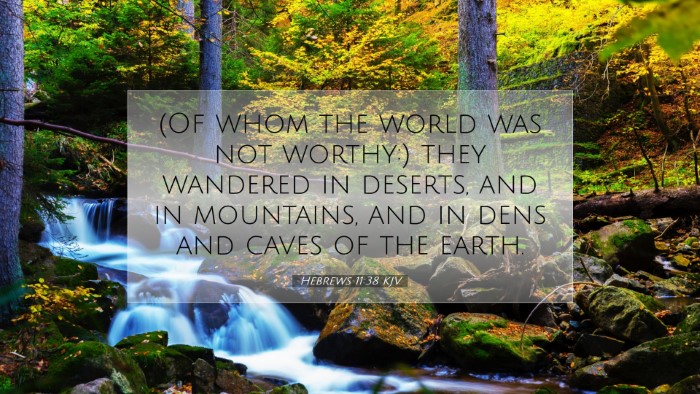Commentary on Hebrews 11:38
"Of whom the world was not worthy; they wandered in deserts, and in mountains, and in dens and caves of the earth."
Introduction
The verse Hebrews 11:38 serves as a profound conclusion to the depiction of faith's triumphs and trials presented in the chapter known as the "Hall of Faith." It encapsulates the lives of those who, although they suffered greatly and were often marginalized, remained steadfast in their faith. This commentary, drawing from notable public domain sources, aims to provide deep insights into the significance of this verse, reflecting on the exemplary lives of the saints, the nature of their suffering, and the absolute worthiness attributed to them by God.
The Character of True Faith
Matthew Henry emphasizes that true faith often leads to a life marked by trials and tribulations. The individuals mentioned in this text did not conform to worldly standards of success and recognition. They are characterized by their perseverance in faith in the face of adversity and their willingness to live in humility.
Henry further elaborates that the faithful were often seen as outcasts in society. Their faith placed them in opposition to worldly values, leading them to experience suffering, loneliness, and even persecution. The true worthiness of such individuals is recognized in the eyes of God, who looks beyond external circumstances and instead values their inner commitment to Him.
The World’s Perspective
Albert Barnes offers critical insights into the phrase "of whom the world was not worthy." This indicates how the world may reject and despise those who genuinely follow God. Such individuals often stand in stark contrast to the values held by society, which tends to glory in power, wealth, and prestige.
According to Barnes, these faithful followers of God—the prophets, martyrs, and saints—were not acknowledged or esteemed by the world, which often equates worth with material success or social status. Their rejection by the world should serve as a testament to their spiritual significance and the depth of their faith.
The Wandering Saints
Adam Clarke expands the discussion by addressing the phrase "they wandered in deserts, and in mountains, and in dens and caves of the earth." This vivid imagery illustrates the extreme conditions endured by those faithful believers. Clarke notes that their wanderings symbolize not only physical exile but also an existential one—an alienation from the comforts and securities of society.
These wanderers are emblematic of the faithful who choose to follow God’s call, often at great personal cost. Their lives serve to remind us of the sacrifices inherent in true discipleship, where earthly comforts are willingly exchanged for spiritual truth and obedience.
The Assurance of Divine Worthiness
This verse brings to light the profound understanding that, despite their suffering and lack of worldly recognition, these faithful individuals are embraced as worthy in God’s eyes. Matthew Henry highlights that while the world may overlook them, they hold an esteemed place in the divine narrative of redemption and faithfulness.
Their worthiness is not measured by their earthly circumstances but by their unwavering faith in God’s promises—a faith that ultimately attains greater acknowledgment in the heavenly realm. God values their sacrifices and perseverance and marks them as His own, promising them eternal reward, despite their apparent insignificance in the eyes of the world.
Lessons for Today's Believers
Hebrews 11:38 serves as a significant exhortation for modern-day believers. The insights from Henry, Barnes, and Clarke together encourage pastors, students, and theologians to develop a robust understanding of what it means to live in faith in a world that often rejects spiritual values.
- Embrace Spiritual Legacy: Understanding that we, too, are part of this continuum of faith might instill courage and tenacity in our spiritual journeys.
- Value of Perseverance: The examples of the faithful remind us that perseverance is essential even when faced with hardship or societal rejection.
- Heavenly Perspective: Cultivating a perspective that looks beyond the immediate and temporal to the eternal keeps believers anchored in faith.
Conclusion
In closing, Hebrews 11:38 serves as a reminder of the paradox of faith—those who are deemed unworthy by society may be regarded as precious treasures in God’s kingdom. The commentaries from Henry, Barnes, and Clarke offer a rich tapestry of insights that encourage believers to reflect on their faith journeys, valuing spiritual truths over worldly recognition and aiming for the lasting joy that comes from being found worthy in Christ.


